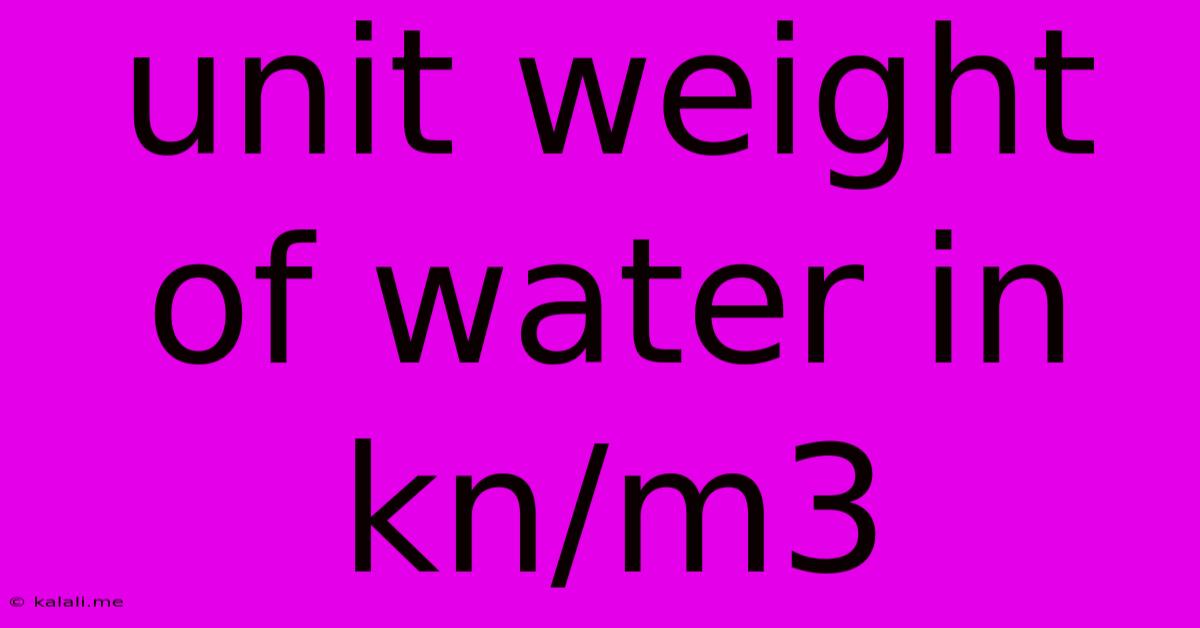Unit Weight Of Water In Kn/m3
Kalali
Jun 13, 2025 · 2 min read

Table of Contents
Unit Weight of Water in kN/m³: A Comprehensive Guide
Understanding the unit weight of water is crucial in various engineering disciplines, particularly in hydrology, hydraulics, and geotechnical engineering. This article will delve into the concept of unit weight, explain its calculation for water, and discuss its practical applications. We'll also touch upon factors that might slightly affect the value and provide you with a clear understanding of this fundamental concept.
What is Unit Weight?
Unit weight, also known as specific weight or unit weight density, represents the weight of a substance per unit volume. It's different from density, which represents the mass per unit volume. Unit weight incorporates the effect of gravity. The standard unit for unit weight is kN/m³ (kilonewtons per cubic meter), though other units like lb/ft³ (pounds per cubic foot) are also used.
Calculating the Unit Weight of Water
The unit weight of water is primarily determined by its density and the acceleration due to gravity. The density of water is approximately 1000 kg/m³ at 4°C (39.2°F). However, this density can vary slightly depending on temperature and salinity. The standard acceleration due to gravity (g) is approximately 9.81 m/s².
The formula to calculate unit weight (γ) is:
γ = ρ * g
Where:
- γ = unit weight (kN/m³)
- ρ = density (kg/m³)
- g = acceleration due to gravity (m/s²)
Therefore, for pure water at 4°C:
γ = 1000 kg/m³ * 9.81 m/s² = 9810 N/m³ = 9.81 kN/m³
This value of 9.81 kN/m³ is widely accepted as the standard unit weight of water in many engineering calculations.
Factors Affecting Unit Weight
While 9.81 kN/m³ is a standard value, several factors can influence the actual unit weight of water:
- Temperature: Water density changes with temperature. As temperature increases, density decreases, leading to a slightly lower unit weight.
- Salinity: Saltwater has a higher density than freshwater due to the dissolved salts. This results in a higher unit weight.
- Pressure: At greater depths, pressure increases, leading to a slight increase in density and therefore unit weight. This effect is usually negligible for most engineering applications.
Practical Applications of Water Unit Weight
The unit weight of water plays a crucial role in a wide range of engineering applications, including:
- Hydrostatic Pressure Calculations: Determining the pressure exerted by a column of water at a specific depth.
- Dam Design: Assessing the forces acting on dam structures.
- Buoyancy Calculations: Determining the buoyant force acting on submerged objects.
- Pipeline Design: Calculating the pressure drop in pipelines carrying water.
- Groundwater Studies: Evaluating the weight of groundwater in soil analysis.
Conclusion
The unit weight of water, typically approximated as 9.81 kN/m³, is a fundamental parameter in various engineering calculations. While factors such as temperature and salinity can slightly influence this value, the standard approximation provides sufficient accuracy for most practical applications. Understanding this concept is crucial for accurate engineering designs and analyses related to water resources and infrastructure.
Latest Posts
Latest Posts
-
What Is The Difference Between A Culture And A Civilization
Jun 14, 2025
-
Gpa Needed For University Of Chicago
Jun 14, 2025
-
Which Of The Following Is A Nonrenewable Energy Source
Jun 14, 2025
-
What Planet Is Known As The Morning Star
Jun 14, 2025
-
Gpa Requirements For Utah State University
Jun 14, 2025
Related Post
Thank you for visiting our website which covers about Unit Weight Of Water In Kn/m3 . We hope the information provided has been useful to you. Feel free to contact us if you have any questions or need further assistance. See you next time and don't miss to bookmark.